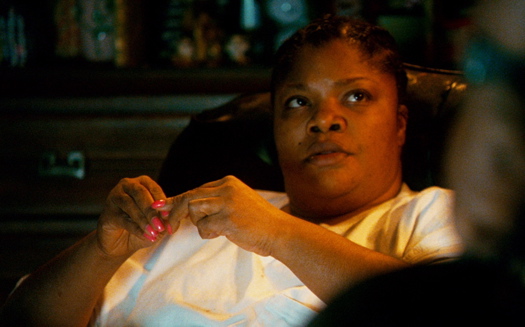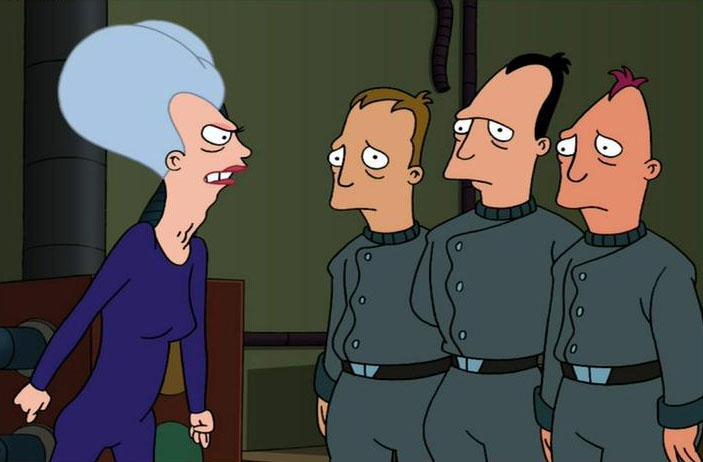Ah Mother's Day, that annual celebration of flowers and pancakes in bed and all that sappy talk about "a mother's love." But not all mothers are as ideal as the greeting card companies make them out to be. And although real life mothers can be pretty bad, fictional mothers can literally create monsters.
1. Carrie's Mother, Margaret
Everyone remembers Carrie, the classic "bullied kid who turns the tables and destroys them all." But many forget that Carrie's mother is largely to blame for Carrie's situation in the first place.
Image copyright United Artists
Carrie's mother Margaret is a mentally unstable and ultra-religious Christian fundamentalist. In addition to abusing Carrie at home, she dresses Carrie in awkward, ill-fitting, out-of-date clothing, thus virtually ensuring that the other kids will pick on Carrie at school.
She also fails to discuss any of the facts of life with Carrie. Thus, when the bewildered Carrie begins to menstruate in the girl's shower at school, she thinks she is dying.
In the end, when Carrie is the victim of a prank, she grossly overreacts. Maybe if her mother hadn't heaped cruelty upon her for the first 15 years of her life, she wouldn't have snapped and killed everyone.
2. Norman Bates' Mother, Norma
Poor little Norman Bates. Growing up alone with his mother, who informs him that sex is a sin, and every other woman in the world is a whore. This overbearing mother creates a kid who is perfectly passive and submissive… right up until he isn't.
Image copyright Paramount Pictures
What's a kid supposed to do, when a mom like that takes a boyfriend? It's like a walking Oedipal Complex. Norman decides that the best answer is a double dose of strychnine, although he keeps his mother's corpse around to keep him company. Later, in the psychiatric hospital, he actually becomes his own mother.
(Norman Bates was loosely modeled on serial killer Ed Gein, whose real-world mother was no prize, either.)
3. The Sixth Sense Poisoning Mom, Mrs. Collins
One of the most shocking scenes in "The Sixth Sense" is also a pivotal moment in the movie. Baby Mischa Barton's ghost leads little Cole to a video cassette, which he queues up on the VCR during her own funeral.
Image copyright Hollywood Pictures
On the tape, we see poor sickly Mischa's stepmother bring her a bowl of soup… but not before adding an extra dollop of household cleaner.
Not only did this scene introduce thousands of movie-goers to "Munchausen By Proxy Syndrome," it's also the turning point in the movie when the good guys (the living) and the bad guys (the ghosts) change places.
4. Precious's Mom, Mary
Precious' mother (played by Mo'Nique) is directly responsible for creating her as a person. She is both physically and sexually abusive (thankfully the movie skips the scene in the book when Mary forces Precious to perform oral sex on her). She fails to protect Precious from the sexual predation of her father, which is why we meet Precious as she is pregnant by her father for the second time. Precious has to resort to stealing food to feed herself, and she has to sneak out to go to school.
Image copyright Lionsgate Films
The movie is considerably less bleak than the book. If Mary is responsible for who Precious was, Precious herself is responsible for creating the person that she will become.
5. The Mother of All Robots (And Three Ineffectual Sons), Carol
All of the robots in the world of Futurama were built by Mom's Friendly Robot Company, a multi-billion-dollar industrial corporation headed - in public - by a sweet, plump little old lady who likes to knit and use folksy sayings.
Image copyright FOX Television
But as soon as the cameras are off, Mom unzips her fat suit and emerges: a stone-hearted witch in an ill-advised cat suit.
There are very few actual antagonists on Futurama, but Mom is one of them. She's a conniving, vicious old broad who thinks nothing of activating the planet's robot population to destroy every human being on Earth to get back at a lover who once spurned her.




